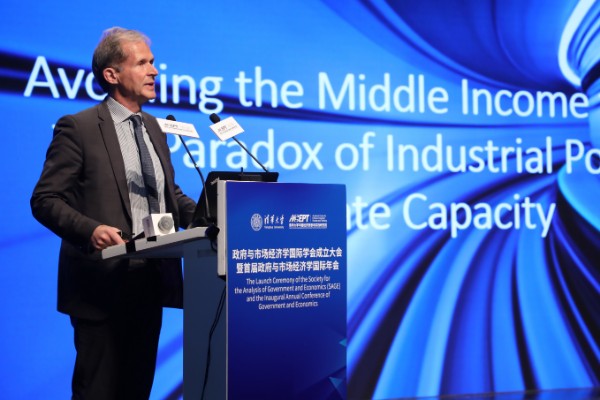
On April 27th, 2019, the Launch Ceremony of the Society for the Analysis of Government and Economics (SAGE) and the Inaugural Annual Conference of Government and Economics was held at the Mong Man Wai Concert Hall, Tsinghua University. Chen Xu, secretary of the CPC Committee of Tsinghua University and director of the School Affairs Committee, and Li Daokui, initiator and co-founding president of SAGE and president of ACCEPT addressed the conference respectively.
Erik Berglof analyzed the impact of national industrial policies on economic development from the perspective of ways to avoid the middle-income trap. Berglof holds that it is quite hard for a single economy to move from middle to high income. Such factors as structural adjustment, social equity, technological change, AI, environmental pollution and employment decrease constitute constraints on emerging developing countries. If the late-developing economies intend to achieve leapfrog development, it would be indispensable for them to implement industrial policies at the national level accordingly. First, the government should be able to provide sufficient public goods. Second, the government should have an independent bureaucracy mechanism to promote the first-mover advantages. Third, the judicial and administrative systems of the government should be independent from each other, and they shall facilitate the moves to maintain and implement the competition mechanism. In the opinion of Berglof, the results of competition vary at different stages of development, and the effect of competition may not meet the expectations of the government. Therefore, during the transitional periods such as the adjustment of industrial capacity, the government needs to abandon uncompetitive enterprises in a bold manner, reduce the degree of decentralization of enterprises, and achieve the goal of improving energy efficiency and reducing pollution. In addition, the government should also clarify its weaknesses, support and supplement specific sectors with vertical industrial policies, so as to enhance the overall economic growth. Berglof believes that China in transition has both the potential and the ability to move towards a higher income level.